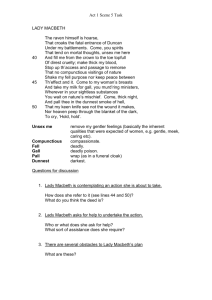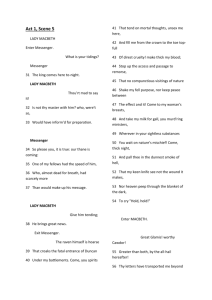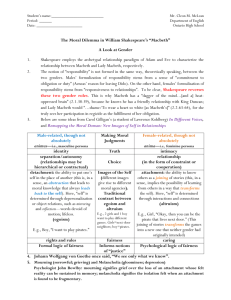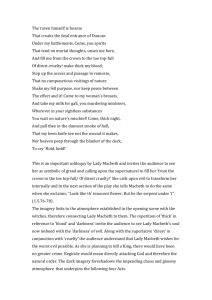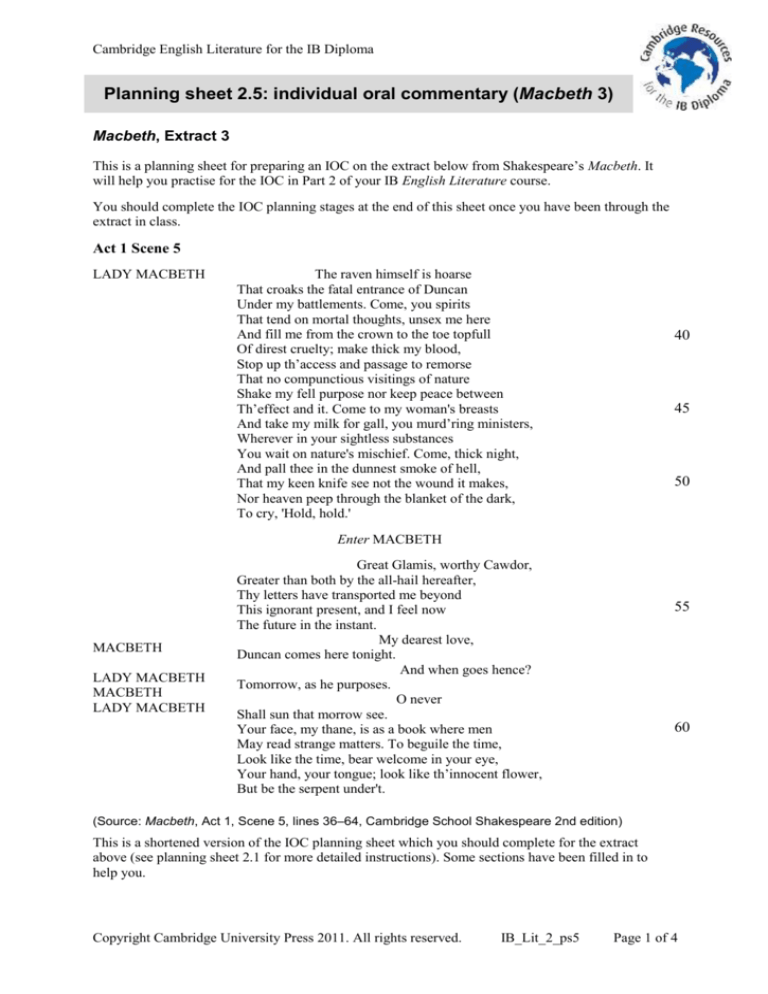
Cambridge English Literature for the IB Diploma
Planning sheet 2.5: individual oral commentary (Macbeth 3)
Macbeth, Extract 3
This is a planning sheet for preparing an IOC on the extract below from Shakespeare’s Macbeth. It
will help you practise for the IOC in Part 2 of your IB English Literature course.
You should complete the IOC planning stages at the end of this sheet once you have been through the
extract in class.
Act 1 Scene 5
LADY MACBETH
The raven himself is hoarse
That croaks the fatal entrance of Duncan
Under my battlements. Come, you spirits
That tend on mortal thoughts, unsex me here
And fill me from the crown to the toe topfull
Of direst cruelty; make thick my blood,
Stop up th’access and passage to remorse
That no compunctious visitings of nature
Shake my fell purpose nor keep peace between
Th’effect and it. Come to my woman's breasts
And take my milk for gall, you murd’ring ministers,
Wherever in your sightless substances
You wait on nature's mischief. Come, thick night,
And pall thee in the dunnest smoke of hell,
That my keen knife see not the wound it makes,
Nor heaven peep through the blanket of the dark,
To cry, 'Hold, hold.'
40
45
50
Enter MACBETH
MACBETH
LADY MACBETH
MACBETH
LADY MACBETH
Great Glamis, worthy Cawdor,
Greater than both by the all-hail hereafter,
Thy letters have transported me beyond
This ignorant present, and I feel now
The future in the instant.
My dearest love,
Duncan comes here tonight.
And when goes hence?
Tomorrow, as he purposes.
O never
Shall sun that morrow see.
Your face, my thane, is as a book where men
May read strange matters. To beguile the time,
Look like the time, bear welcome in your eye,
Your hand, your tongue; look like th’innocent flower,
But be the serpent under't.
55
60
(Source: Macbeth, Act 1, Scene 5, lines 36–64, Cambridge School Shakespeare 2nd edition)
This is a shortened version of the IOC planning sheet which you should complete for the extract
above (see planning sheet 2.1 for more detailed instructions). Some sections have been filled in to
help you.
Copyright Cambridge University Press 2011. All rights reserved.
IB_Lit_2_ps5
Page 1 of 4
Cambridge English Literature for the IB Diploma
Guiding question 1:
Guiding question 2:
What do we learn about Lady Macbeth and about the relationship between
Macbeth and Lady Macbeth from this passage?
What is interesting about the language Shakespeare uses in this scene?
Theme/ idea 1:
Theme/ idea 2:
A key theme developed here is the difference between appearance and
reality, which runs throughout the play.
Theme/ idea 3:
Introduction to commentary
Theme/ idea 1
Quotations to support idea
Notes on language/ structure/ form
Copyright Cambridge University Press 2011. All rights reserved.
IB_Lit_2_ps5
Page 2 of 4
Cambridge English Literature for the IB Diploma
Theme/ idea 2
Quotations to support idea
Notes on language/ structure/ form
Your face, my thane, is as a book where
men / May read strange matters.
look like th’innocent flower, / But be the
serpent under't.
The key theme of appearance and reality is
developed here. The simile picks up on Duncan’s
earlier line ‘There’s no art to read the mind’s
construction in the face.’
Interesting note of possessiveness in ‘my Thane’.
The ‘strange’ matters perhaps recall the
‘equivocation of the fiend’ – the strange business
of the ‘weird sisters’.
Shakespeare seems to be making a reference to
how facial expressions can be read, and be
interpreted in different ways, rather like language
we read in a book.
Metaphor continues the exploration of
appearance and reality, with something dark and
sinister intrinsic to the image.
The imagery is more overt: the serpent could be
the tempting serpent of the Bible and Lady
Macbeth wants Macbeth to be more like her (the
serpent) and less ‘innocent’.
Copyright Cambridge University Press 2011. All rights reserved.
IB_Lit_2_ps5
Page 3 of 4
Cambridge English Literature for the IB Diploma
Theme/ idea 3
Quotations to support idea
Notes on language/ structure/ form
Conclusion to commentary
Copyright Cambridge University Press 2011. All rights reserved.
IB_Lit_2_ps5
Page 4 of 4




